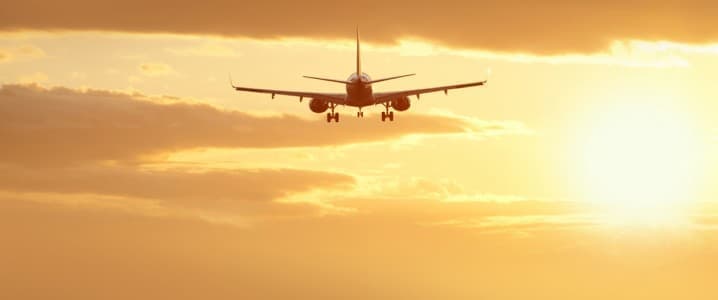Increased fuel prices driving up flight costs doesn’t seem to be deterring winter travelers who are eager to get back on the plane after almost two years of Covid restrictions curbing tourism and business travel. Airlines and travel agencies are forecasting a significant increase in the number of travelers over the Christmas period, as lockdowns continue to ease, and several international travel routes reopen. Airlines and travel companies are finally reporting profits and a more optimistic outlook for the rest of 2021 and throughout 2022, following losses of £35 billion in 2020. The International Air Transport Association (IETA)’s end-of-year report suggests air cargo has recovered above 2019 levels and is expected to continue to increase. Meanwhile, the financial performance across airlines is expected to recover in all regions in 2022.
But jet fuel is at its highest price since 2014 due to the elevated price of oil, with the U.S. jet fuel benchmark at $2.27 a gallon last week, a 25 percent increase from three months ago. While people are eager to book flights once again, they may be in for a shock when they see ticket prices that were significantly lower in previous years. With most airlines no longer receiving government financial support, which helped many firms keep afloat during the worst of the pandemic, companies are having to employ and pay more pilots, flight attendants, travel agents, and airport staff to meet the growing demand with their own finances, betting on the return.
For flights booked before the price of jet fuel increased so much, it seems likely that airlines will take a loss, increasing the price of future flights to make back some of this money. The winter rush is bittersweet, as airlines must contend with higher flight and employment costs, betting on the stability of the international Covid situation – where lockdowns are minimal and travel routes remain open - to reap the rewards.
Southwest has responded to the increase in demand and difficulties in staffing by offering flight attendants, pilots, and other operations staff up to 120,000 Rapid Reward points, at a value of over $1,400, to work 36 days over the next two busy festive months. This follows an increase in the number of airline staff calling in sick. Southwest is trying to avoid a repeat of its Columbus Day weekend failings when the airline was forced to cancel over 2,000 flights, at an estimated cost of $75 million.
In Europe, flight reservations are also on the up. Spain’s flight numbers are already edging above pre-pandemic levels. Spain’s ALA airline association president Javier Gandara stated last month, "There are currently 1.9% more flights programmed for this winter period - roughly from November to March - compared to 2019.” Adding, "for the Canary and Balearic Islands, planned flights are over 10% higher than in 2019."
AirFrance-KLM is expecting a 75 percent increase in passengers over the festive period. Reservation figures went up after the U.S. announcement that it would be permitting travel from 26 Schengen Area countries, with announcements of border openings in Canada and Singapore supporting the trend. Related: Taking A Flight Soon? Prepare To Pay More As Oil Prices Rise
Benjamin Smith, CEO of Air France-KLM Group Board of Directors stated, “For the first time since the beginning of this Covid-19 crisis, the Q3 results show a positive operating result which encourages us to continue our efforts.” Revenue figures for quarter three total around $5.16 billion, up from $2.3 billion during the same period in 2020.
But airlines are concerned with managing this dramatic increase in flight and passenger traffic after almost two years of reduced services. Increased congestion in Europe’s skies could lead to flight delays and cancellations if not well-managed. In addition, there is a concern around waiting times in airports as well as coordination across different countries owing to the need for more passenger documentation. Passengers now are often required to provide proof of vaccination, a negative PCR or antigen test, and in some cases the reason for essential travel, all of which vary from country to country.
Airlines are now hedging the price of fuel, essentially buying it forward, to protect themselves from rising fuel prices, with experts predicting that the Brent oil benchmark could reach $90 per barrel before the end of the year, and continuing to rise. Some European budget airlines are relying on this tactic to cut costs, with 80 percent of Ryanair’s fuel requirements already hedged for 2022.
But higher fuel costs, meaning increased flight prices, does not appear to be dampening consumer demand for winter travel. In fact, the forecast this month from the World Tourist and Travel Council (WTTC) is predicting that U.S. travel in 2022 could surpass that of 2019 pre-pandemic levels. The WTTC also expects travel expenditure to increase over the next year. This is expected to have a knock-on effect on employment, with more job opportunities opening up.
While the cost of fuel is concerning for airlines that are still trying to win back their customers after almost two years of pandemic restrictions, as well as battling against climate change concerns and a generally weakened global economy, the added expense doesn’t seem to be deterring travelers, offering travel companies a reason to be optimistic.
ADVERTISEMENT
By Felicity Bradstock for Oilprice.com
More Top Reads From Oilprice.com:
- Chinese Crude Oil Imports Drop To Three-Year Low In October
- Natural Gas Prices Soar As Putin Punks Europe
- Why Uranium Stocks Are Soaring

















